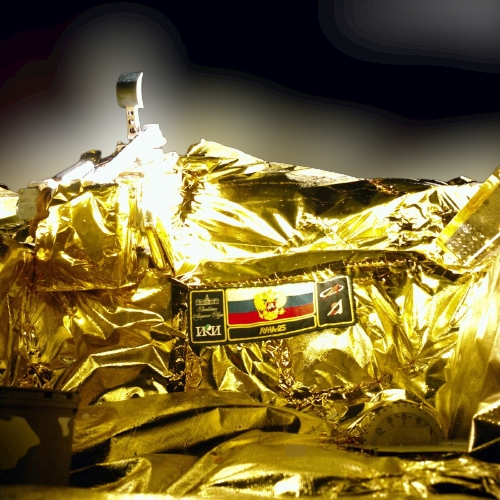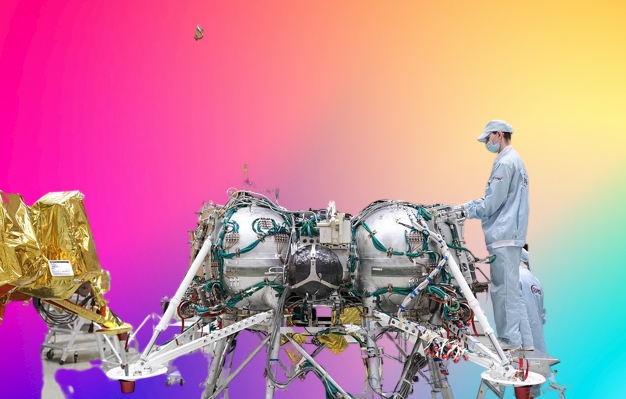Table of Contents
Introduction about Luna-25 Probe

A heartrending turn of events has dimmed the hopes of space exploration enthusiasts, as Russia’s Luna-25 probe, a pioneering effort after almost fifty years of absence, met a tragic fate on the Moon’s desolate terrain. The profound setback unfolded during the intricate ballet of pre-landing maneuvers, shattering the dreams of a successful lunar mission.
In a solemn announcement on August 20, the esteemed Russian space agency Roscosmos disclosed the grim outcome, casting a poignant shadow over the trajectory of space history. The Luna-25 probe, a testament to Russia’s commitment to rediscovering lunar realms, found its journey cut short by an unexpected collision with the very body it sought to unveil.
This poignant setback highlights the unforgiving nature of space exploration, reminding humanity of the inherent risks that accompany our quest for knowledge beyond our home planet. As the lunar dust settles on this unfortunate event, scientists, engineers, and dreamers alike are left to contemplate the intricate balance between progress and the untamed cosmos, reigniting the age-old question: how far are we willing to reach to uncover the mysteries that lie among the stars?
communication lost amidst pre-landing manoeuvres
Roscosmos has sadly announced the loss of communication with the Luna-25 probe at 2:57 pm (1157 GMT) on Saturday. Initial findings suggest a devastating outcome: the lander’s collision with the lunar surface led to its apparent disintegration. This heartbreaking event transpired during the probe’s crucial maneuvers to transition into its pre-landing orbit, casting a somber shadow over its mission and highlighting the unforgiving nature of space exploration.
Unraveling the incident:

An “abnormal situation” on August 20 hindered the planned maneuver of the automatic station, as stated by Roscosmos. A dedicated commission is now investigating the factors that led to this failure, unraveling the complex circumstances that contributed to the mishap.
Unfulfilled lunar aspirations:
The Luna-25 probe’s crash serves as a poignant reminder of Russia’s waning dominance in space exploration. Once a pioneering force during the Cold War, Russia’s space achievements have ebbed since then. While the country’s space legacy boasts milestones like launching Sputnik 1 in 1957 and sending Yuri Gagarin into space in 1961, the recent mishap underscores the challenges it faces in the modern era.
Challenging lunar landscape:

Russia’s lunar ambitions have faced numerous delays and setbacks over the past decades. Economic and political turmoil in the wake of the Soviet Union’s collapse disrupted several moon mission plans. The failed 2011 Fobos-Grunt mission to Mars’ moon highlighted the complex hurdles Russia’s space program grapples with, reflecting the intricate nature of space exploration.
Future endeavors and global competion

In the midst of this setback, Russia is determined to stay in the race against the ticking clock and its global competitors. As China and the United States surge ahead with their lunar dreams, Russia is working hard to stay in step. The recent crash of the Luna-25 probe serves as a stark reminder of the challenges faced by Russia’s economy and its space industry, adding weight to an already demanding situation.
China and the United States are making great strides in their lunar endeavors, intensifying the sense of urgency for Russia to maintain its presence in this high-stakes competition. The unfortunate mishap involving the Luna-25 underscores the strain on resources and the high expectations placed upon Russia’s space sector.
Amidst this dynamic backdrop, the worldwide pursuit of lunar exploration continues unabated. The Moon, a symbol of human curiosity and ambition, is the shared target in this grand cosmic race. Despite the hurdles and setbacks, the unyielding spirit of exploration persists, urging countries to push beyond limits and venture further into the unknown.
In this global quest to conquer the Moon, the lessons learned from both triumphs and failures inspire a collective determination to push the boundaries of possibility. While setbacks like the Luna-25 crash test our resolve, they also ignite a renewed drive to overcome challenges, unite as explorers of the cosmos, and etch our presence on the tapestry of the universe.
Conclusion:
The Luna-25 probe’s tragic crash serves as a poignant moment that sheds light on the challenges and complexities of space exploration. As Russia grapples with this setback, the quest to conquer the cosmos continues, driven by ambition, technology, and the unyielding human spirit to explore the unknown.


